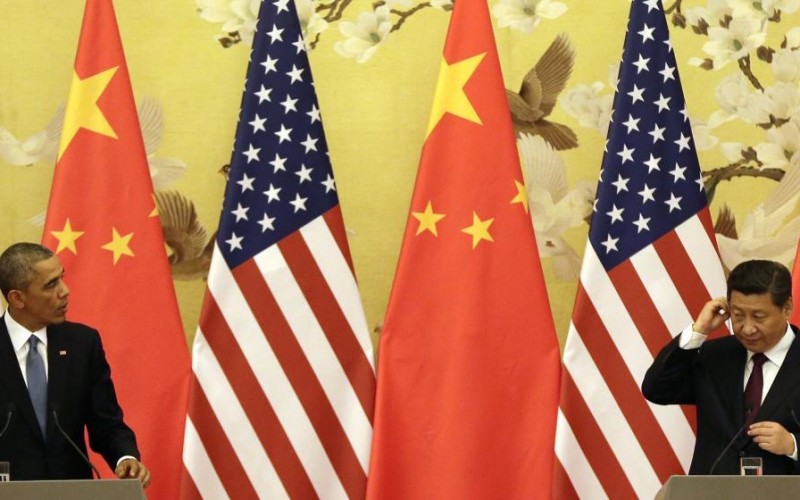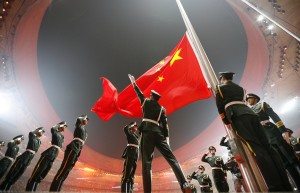Despite rising tensions stemming from Beijing‘s assertiveness over the Asia Pacific and alleged involvement in recent cyber-attacks targeting Washington, President Xi Jimping’s upcoming state visit to Washington represents an important step in Sino-American relations.

The expected upcoming visit of President Xi Jimping to Washington offers an interesting opportunity to assess the development of Obama’s policy toward China. Characterised by American wishes to see Beijing play a greater role in the world affairs, the trip will also shaping a diplomatic framework based on a new model of Major Power Relations.
Despite Beijing’s reassurance that the rise of China is following a path of prosperity and peaceful development, many analysts in Washington fear that such an expansion would strongly affect the peace and stability of the Asia Pacific region, representing a direct threat.
Pivot to Asia
Despite initial attempts to contain Beijing via the “Pivot to Asia” policy, Washington now seems to be more determined to establish a constructive dialogue with Beijing. Specifically, the U.S. recognises China’s strategic interest in the region and, at the same time, is reassuring Pacific allies about Washington’s ongoing efforts to maintain regional stability.
A key element of this plan is contingent on preventing China from imposing new forms of regional hegemony, through the direct or indirect control of vital SLOCS located in the East China Sea.
In order to prevent dreadful escalations that might jeopardise the regional security architecture, the Obama administration has clearly stated its commitment, declaring the protection of a rule of law-based regional order, the peaceful resolution of territorial disputes, and protection of the freedom of navigation as core interests.
During the evolution of the U.S.’s Asia rebalance strategy, Washington has adopted different strategies to strengthen its security architecture and expand allied and new actor participation. This strategy has been built on three main pillars; Firstly expanding U.S military presence and enhancing strategic capabilities such as air, naval, missile defence and reconnaissance assets in the region. Secondly, upgrading and expanding the roles and responsibilities of allies with respect to regional defence cooperation, as well as promoting the participation of new regional actors (Indonesia, Malaysia, Singapore and Vietnam).
Lastly, Washington is encouraging participation from regional actors to regional organisation, such as ASEAN and APRC, with the aim of supporting the implementation of multilateral security agreements with states willing to be part of the U.S. security umbrella.
Fighting over who gets to keep the peace
In the last few years, the “Great Rejuvenation of the Chinese Nation” has become the new shibboleth among the Chinese politburo. Under the influence of a new Sino-centrist model, the fifth generation of CCP leaders have embodied the pledge of restoring past national greatness and ushering in a new era.
Unsurprisingly, China’s rapid changes in the last decades have led many to speculate on China’s behaviour on the world stage. The crux of such discussions is whether China is seeking hegemony at the expense of the United States or if its peaceful rise can be a viable tool to promote regional stability and prosperity?
For a long time, Chinese leaders have been cautious towards Washington, and despite Xi Jinping’s remarks about developing a new framework for great power relations, little progress has been made. Nevertheless, China has continuously emphasised the nature of the emerging Pax Sinica, basing its new regional engagement on two main cornerstones: the respect of other countries’ sovereignty, and the the concept of an “interest community” as the main diplomatic tool with which to engage neighbouring countries.
Moreover, China is also seeking to promote strong partnerships with new allies; with Beijing touting the benefits of entering its strategic sphere of interest, such as mutual prosperity via the Silk Road Initiative and the Maritime Silk Road strategies.
Indeed, China strongly demands recognition of its regional sphere of strategic interests; demands which are a direct consequence of a Confucian statecraft vision, as restored under Xi Jinping. Furthermore, according to many analysts; China’s massive military expansion, robust assertiveness in dealing with territorial issues in the South China Sea, and insatiable appetite for important regional energy sources reflects Beijing’s efforts to establish its own Monroe Doctrine in the region.
Nevertheless, the erosion of American power in East Asia due to the American focus on the Middle East during the Bush years allowed China to expand its strategic presence in the region at Washington’s expense.
China as a revisionist power
Despite Washington’s acceptance of this new status quo, Beijing is less inclined to establish common frameworks for strategic cooperation due to its nature as a revisionist power. China has also only displayed a minor interest in being more engaged in transnational issues such as humanitarian intervention, cyber security and non-proliferation.
Instead, it has shown a greater commitment to establish and strengthen regional and trans-regional economic and strategic initiatives, such as the BRICS Developmental Bank, Asian Infrastructure Investment Bank, and Shanghai Cooperation Organization.
Recent Chinese diplomacy has been characterised by emerging revisionist behaviour. Consequently, despite several attempts to reach mutual positive outcomes in bilateral relations with Washington, few results have been achieved so far. Beijing’s fears about Obama’s rebalancing strategy – considered a direct threat to Chinese strategic interests – and the reluctance of Beijing to assume wider responsibility for regional security promotion hampers cooperation with the U.S. Bilateral relations are also strained due to China’s rising involvement in cyber-attacks, which have surely undermined the chance of overcoming diplomatic ambiguity and mistrust.
In the next Sino-American summit, Washington is expected to strongly rectify the trajectory of the bilateral relations, bringing to the table a new security framework that would allow Beijing to reduce tensions with neighbouring countries, but also to leave enough room for Obama to reinvigorate American strategic initiatives with regional allies by upholding freedom of navigation and flight, thus preserving the delicate regional status quo.
sourche: http://globalriskinsights.com/2015/09/despite-tensions-chinas-state-visit-to-us-an-important-step/


Δεν υπάρχουν σχόλια:
Δημοσίευση σχολίου